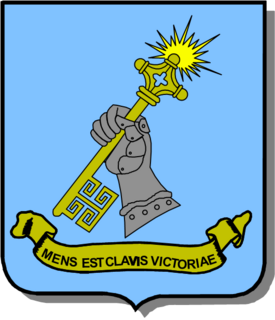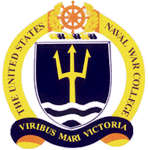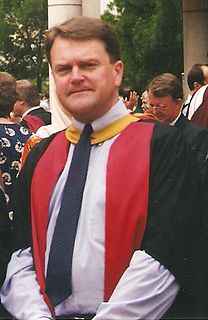Related Research Articles

The School of Advanced Military Studies (SAMS) is one of four United States Army schools that make up the United States Army Command and General Staff College (CGSC) at Fort Leavenworth, Kansas. This "enormously rigorous" graduate school comprises three programs: the larger Advanced Military Studies Program (AMSP); the Advanced Strategic Leadership Studies Program (ASLSP), a Joint Military Professional Education II certified senior service college program for senior field-grade officers, and the Advanced Strategic Planning and Policy Program (ASP3), which supports officers in obtaining doctorates from civilian schools.
Military science is the study of military processes, institutions, and behavior, along with the study of warfare, and the theory and application of organized coercive force. It is mainly focused on theory, method, and practice of producing military capability in a manner consistent with national defense policy. Military science serves to identify the strategic, political, economic, psychological, social, operational, technological, and tactical elements necessary to sustain relative advantage of military force; and to increase the likelihood and favorable outcomes of victory in peace or during a war. Military scientists include theorists, researchers, experimental scientists, applied scientists, designers, engineers, test technicians, and other military personnel.
Military strategy is a set of ideas implemented by military organizations to pursue desired strategic goals. Derived from the Greek word strategos, the term strategy, when it appeared in use during the 18th century, was seen in its narrow sense as the "art of the general", or "'the art of arrangement" of troops. Military strategy deals with the planning and conduct of campaigns, the movement and disposition of forces, and the deception of the enemy.
Military doctrine is the expression of how military forces contribute to campaigns, major operations, battles, and engagements.

The Naval War College is the staff college and "Home of Thought" for the United States Navy at Naval Station Newport in Newport, Rhode Island. The NWC educates and develops leaders, supports defining the future Navy and associated roles and missions, supports combat readiness, and strengthens global maritime partnerships.

Sir Hew Francis Anthony Strachan, is a British military historian, well known for his leadership in scholarly studies of the British Army and the history of the First World War. He is currently professor of international relations at the University of St Andrews. Before that Strachan was the Chichele Professor of the History of War at All Souls College, Oxford.
Staff colleges train military officers in the administrative, military staff and policy aspects of their profession. It is usual for such training to occur at several levels in a career. For example, an officer may be sent to various staff courses: as a captain they may be sent to a single service command and staff school to prepare for company command and equivalent staff posts; as a major to a single or joint service college to prepare for battalion command and equivalent staff posts; and as a colonel or brigadier to a higher staff college to prepare for brigade and division command and equivalent postings.

The Australian Defence College (ADC) comprises three joint education and training organisations operated by the Australian Defence Force in Canberra, Australian Capital Territory:

Lieutenant General Franklin Lee Hagenbeck is a retired United States Army officer who served as the 57th Superintendent of the United States Military Academy from June 2006 to July 2010. Previous to his assignment at West Point, he was the Deputy Chief of Staff, G-1 United States Army, Washington, D.C.

The Air War College (AWC) is the senior Professional Military Education (PME) school of the U.S. Air Force. A part of the United States Air Force's Air University, AWC emphasizes the employment of air, space, and cyberspace in joint operations. Headquartered at Maxwell Air Force Base in Montgomery, Alabama, its higher headquarters is the Air Education and Training Command (AETC) at Randolph Air Force Base in San Antonio, Texas. It is one of six war colleges within the U.S. Department of Defense's Joint Professional Military Education (JPME) Phase II Education Program for commissioned officers.

Christopher Bassford is an American military historian, best known for his works on the Prussian military philosopher Carl von Clausewitz. Bassford graduated from the College of William and Mary with a degree in history and honors for his dissertation on tactical nuclear weapons and completed his MA in American diplomatic history at Ohio University. Subsequent to receiving his MA, he served five years on active duty as a U.S. Army field artillery officer, with tours in Korea and Germany. He completed a Ph.D. in modern European history at Purdue University and became director of studies in the theory and nature of war at the U.S. Marine Corps (USMC) Command and Staff College, then associate professor of National Policy Issues at the U.S. Army War College. He was Professor of Strategy at the National War College, in Washington, D.C., from 1999 until 2012, when he joined the faculty of the College of International Security Affairs as part of the JSOMA program supporting U.S. Army Special Operations Command (USASOC). He is the webeditor of The Clausewitz Homepage, a large educational website that has been on-line since 1995.
David Murray Horner, is an Australian military historian and academic.
Irregular warfare (IW) is defined in United States joint doctrine as "a violent struggle among state and non-state actors for legitimacy and influence over the relevant populations." Concepts associated with irregular warfare are older than the term itself.

The Basic Strategic Art Program (BSAP) is an academic program taught at the U.S. Army War College at Carlisle Barracks, Pennsylvania. The course was designed to support the educational requirements for Functional Area FA59 (FA59), U.S. Army Strategist, formerly called Strategic Plans & Policy. The first course began in 2003 and the school continues to teach three 16-week courses per year.
James Sterling Corum is an American air power historian and scholar of counter-insurgency. He has written several books on counterinsurgency and other topics. He is a retired lieutenant colonel in the US Army Reserve.

David William Barno is a retired lieutenant general of the United States Army. He was commander of Combined Forces Command-Afghanistan from 2003–2005.

William C. Martel was a scholar who specialized in studying the leadership and policymaking processes in organizations, strategic planning, cyberwarfare and militarisation of space, and technology innovation. He taught at the U.S. Air War College and U.S. Naval War College, and performed research for DARPA and the RAND Corporation. He later become Associate Professor of International Security Studies at the Fletcher School of Law and Diplomacy, a position he held until his death in 2015.
The Fletcher School's International Security Studies Program is a center for the study of international security studies and security policy development. It was established in 1971 at The Fletcher School of Law and Diplomacy, Tufts University. ISSP conducts its academic activity through courses, simulations, conferences, and research. It also has a military fellows program for midcareer U.S. officers.

Jeffrey Guy Grey was an Australian military historian. He wrote two volumes of The Official History of Australia's Involvement in Southeast Asian Conflicts 1948–1975, and several other high-profile works on Australia's military history. He was the first non-American to become the president of the Society for Military History, but is perhaps best known as the author of A Military History of Australia.
Richard Michael Connaughton is a British Army officer and author specialised in military history.
References
- ↑ See Daniel Marston SAIS
- ↑ "Daniel Marston" . Retrieved 9 February 2017.
- ↑ "Daniel Marston" . Retrieved 9 February 2017.
- 1 2 Director (Research Services Division). "Professor Daniel Marston" . Retrieved 9 February 2017.